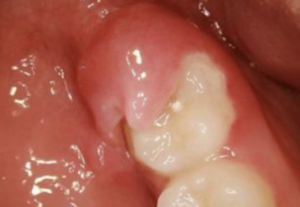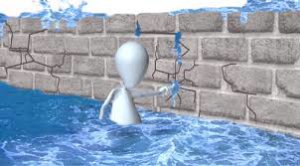Gum inflammation
Gum disease generally responds very well to homeopathy. I will outline the progress of this case with the permission of the patient. My goal is to help the reader to illustrate a partially effective treatment progress that can be expected from aging patients.
Support for the elderly
 Elder care has an important place in homeopathy. Unfortunately, often because the problem has multiple causes and tissues are damaged beyond repair, the incredible results found with younger patients are no longer possible. For elderly patients, treatment pace and strength totally depends on the patient's level of health. Fundamentally, it is no different from the treatment of any other age group. Most of all, I adjust my evaluation of results. On the positive side, similar to any other age group, other medical procedures are delayed or prevented, medications are reduced and often patients are much more comfortable than they were before homeopathy was used. I think this is good enough. Not magic, but homeopathy is a medicine that does no harm and does much good. Often, results are much better than the increased medication, surgery and an increase in the number of chronic diseases that are seen among the elderly under the care of only a typical medical specialist.
Elder care has an important place in homeopathy. Unfortunately, often because the problem has multiple causes and tissues are damaged beyond repair, the incredible results found with younger patients are no longer possible. For elderly patients, treatment pace and strength totally depends on the patient's level of health. Fundamentally, it is no different from the treatment of any other age group. Most of all, I adjust my evaluation of results. On the positive side, similar to any other age group, other medical procedures are delayed or prevented, medications are reduced and often patients are much more comfortable than they were before homeopathy was used. I think this is good enough. Not magic, but homeopathy is a medicine that does no harm and does much good. Often, results are much better than the increased medication, surgery and an increase in the number of chronic diseases that are seen among the elderly under the care of only a typical medical specialist.
A 60-year-old patient came into my office with multiple problems related to aging. None were urgent and he was taking no medications for anything. I treated him for years for specific local conditions, but never found a spectacular chronic remedy for his main problem, atherosclerosis. Unlike other patients, one remedy did not heal most of his other problems. Menier’s disease disappeared, wounds healed, pain in the chest was a little better, and etc. His chest pain was particularly frustrating to me. Trying already remedy for his chest pain, again I was unimpressed with minor results.
Gum inflammation
 Two years before this writing at age 72, while he was on vacation, he called about inflammation of the gums. His teeth were extremely crowded because he was born with large teeth and a small jaw. He had a previous abscess that was treated by his dentist. Antibiotics damaged his digestion slightly. The dentist had predicted that he would lose all of his teeth due to gum inflammation. Despite this dire prediction, the patient had managed to keep his teeth during ten years of homeopathic care. This time, the inflammation was swelling his gums and he was in a foreign country where he would not find a dentist easily. Luckily, he had brought his emergency homeopathic kit.
Two years before this writing at age 72, while he was on vacation, he called about inflammation of the gums. His teeth were extremely crowded because he was born with large teeth and a small jaw. He had a previous abscess that was treated by his dentist. Antibiotics damaged his digestion slightly. The dentist had predicted that he would lose all of his teeth due to gum inflammation. Despite this dire prediction, the patient had managed to keep his teeth during ten years of homeopathic care. This time, the inflammation was swelling his gums and he was in a foreign country where he would not find a dentist easily. Luckily, he had brought his emergency homeopathic kit.
Chronic remedy was chosen
Since this was his third incident of gum inflammation, I judged his condition to be chronic. Chronic treatment must cover multiple dimension of a patient. I knew his other chronic symptoms, personality and body type well, so I added some of those “symptoms” to the few symptoms that reflected his gum inflammation. This was enough to come up with what homeopaths call a "chronic polychrest" remedy. That is, a well-known remedy which works at a much deeper level than a remedy like an acute remedy Arnica that is prescribed on superficial symptoms alone. Note that Arnica will work at a deep level if it is chosen as Silicea was in this case, based on multiple dimensions of the person,
Silicae is effective.
In three days, this familiar polychrest remedy took down the swelling so he could chew. The remedy was made of sand, named Silicea = silica.
After this, he continued to see me for his more important chronic problem. I tried a third chronic remedy aimed at his atherosclerosis symptoms. Gum disease was no longer a problem so we forgot about it. The remedy for his vascular condition was also a familiar polychrest. Natrum muriaticum is made of salt. His results were only partial. At least, he was not getting worse and the chest pain was a bit better.
Gum inflammation re-occurs.
Then, suddenly again the gums of a back molar became inflamed. Aside from the swelling, he could only tell me that the pain was excruciating. I asked him to try the remedy that had worked before (Sand = Silicaea). Within a day, taking the remedy 3 times a day, we were sure that Silicea a was not effective.
Healed by an unusual remedy
Justifying my remedy choice
By searching for his symptoms in a different computer data base, I found a remedy made from the waters of a healing spring in Germany. The chemical breakdown of these healing spring waters included 50% salt and a significant portion of silica. I had given him both salt and Silicae before and they were both beneficial. Silicea had cure the gum inflammation and salt had a mildly positive effect on his vascular condition.
There were no test results (proving results) for this remedy, but it had a long history of clinical usage. The hot springs were well known for their healing powers. Among the symptoms that the remedy was known to cure was swelling of the gum during an inflammation. So, I thought, it would not hurt to try.
Excellent results
Within 6 hours after taking his remedy, his gum swelling disappeared. Several days after taking the remedy, he became very angry. Much like a child throwing a tantrum. This gentleman was extremely polite and rarely expressed anger. Yet, interviewing had revealed strong indignation for perceived insults. So, I was pleased with the results. Suppressed anger had surfaced. Hopefully this release, that would help to relieve the atherosclerosis symptoms. I was unable to assess his anger, however, because suppression of negative emotion was central to his personality.
Prognosis
By this time he was 74 years old. Because the nerves of several teeth had been removed and the condition of his teeth was generally poor, I reasoned that there was really no long-range hope that homeopathy could save his teeth. At age 74 he was already supposed to have lost his teeth, so he was complaining about his results. Being a very optimistic and stubborn person, he had made few lifestyle changes to support his vulnerable vascular system. Thus, the power of homeopathy was minimal compared to the possible results of a younger, more cooperative patient.

This kind of treatment is like a finger in the dam (from the story of Hans Brinker who stuck his finger in a Dutch dam and prevented the breaking of a dam.) No doubt, homeopathic remedies are slowing the inevitable deterioration of aging. I am providing him"palliating" remedies. Probably in time he will die of old age in decent health. Yet, homeopathic treatment results are certainly much more than what aggressive normal medicine could do.

